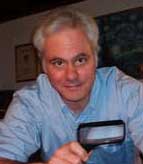Behind the Dictionary
Lexicographers Talk About Language
The Grandiloquent Gumshoe Speaks

Language authority Charles Harrington Elster is the "Grandiloquent Gumshoe," a word sleuth who gives no quarter to pompous usage and other tomfoolery. The author of The Big Book of Beastly Mispronunciations and What in the Word?, Charles is also a seasoned radio commentator and, as he says, "a fellow woolgatherer in the world of words." We had a lively discussion with him about language, usage -- and where he draws the line.
VT: Are you a relativist or absolutist when it comes to language?
Charles: I think I fall somewhere in between. I don't want to speak in platitudes but your decision about usage is as valid as the next person's. I'm not a relativist where language is concerned but I am a believer that everybody is a "professor of English." You have to make your own decisions about how you're going to use the language. The question is, how much information have you taken in? How informed is your decision?
VT: But can't a person go a little overboard?
Charles: I get people who write me and say, I'm all charged up about prepositions at the ends of sentences! Or something like that. I hear this time and again. I have to tell them that they're talking about a cherished superstition. They're getting upset about things they don't need to get upset about. But, then again, there is plenty to get upset about out there.
VT: What gets you upset?
Charles: Well, I like to call myself a "liberal purist." I put the "purist" after the liberal to show that I believe in standards, but I look at language as an art and a craft. For me, it's not a science or some object of scientific empirical observation. I think we all need to make judgments about language. When we don't, it means we don't care. I think that having standards and doing our best to abide by them is a way of establishing a community of communication. It's a way of sharing the language and also safeguarding it.
VT: But don't standards change?
Charles: Of course they do. If you look at how words are spelled in Samuel Johnson's dictionary of 1755, you'll see they're different from today. Things evolve. People sometimes say to me, Hey, language changes, man, go with the flow. I like to tell them yes, that's true, but we're not talking about the news. It's not as if there's a fresh thing every morning.
On the other hand, with pronunciation you can actually get changes overnight. Writing about pronunciation is especially tricky because that aspect of the language is in fact more volatile than written. A wholly new variant of a word can just appear. A sound bite of somebody blatantly mispronouncing a word can circumnavigate the globe in 20 minutes.
In the introduction to my Big Book of Beastly Mispronunciations I explained that "I am not opposed to change. Such a position would be untenable. But I'm skeptical of ignorant, pompous, and faddish change. I'm annoyed when people invent pronunciations for unfamiliar words. And I'm exasperated when they can't be bothered to check the pronunciation of a word they look up in a dictionary. Only time can tell what will perish and what will prevail. In the meantime, however, pronunciations born of laziness and parrotry will feel the lash of my pen."
VT: What about usage?
Charles: I would say the same thing. I just would change the word from pronunciation to usage. I get just as exasperated about ignorant, pompous, and faddish usage. That to me is not acceptable. I cannot bring myself to just say okay, change is change. No. Some change is good. Some change is bad. I believe in and I maintain my right to discriminate in language because, as I said before, it's an art and it's a craft.
VT: But what about that liberal side of you?
Charles: I say, bring it on, this is a living language. Slang can be as exciting and beautiful as mainstream fiction or poetry. We need all of it to keep the language vital and to keep coining new words. The ones that we find useful will live and the ones we don't will die. I just ask you to please be a discriminating person as you travel this road of language usage. If you encounter a word like, say, "methodological," will you say that it's a nice, pretty word, a word that falls trippingly from the tongue? No - it's a dull, pompous, freighted word that dull, pompous people invented to make themselves appear intelligent.
Words sometimes broadcast their own beauty or ugliness. I'm on a lifelong boycott of "unique" and "impact." I will not use these words because they have become meaningless from thoughtless overuse. Think of how many wonderful synonyms there are for those two words. "Unique" has just been so overworked for "unusual" that we now feel the need to modify it. And you've heard "what an incredible, positive impact is that going to have." What's wrong with the words "effect" and "influence?" They've worked for centuries.
I am often accused of being pompous, but such ad hominem jabs don't bother me at all. When you assert your right to voice your opinion about words, you open yourself to criticism, and if someone mistakes my passion for language for pomposity, so be it. I consider myself a defender of cultivated speech and a champion of verbal clarity, freshness and style.
(photo credit: John Uphouse)

